#white hat linking services
Explore tagged Tumblr posts
Text
Building Campaigns: Elevating Your Website's SEO Strategy

In the world of digital marketing, a well-executed link building campaign is one of the most effective ways to improve your website’s search engine rankings. It involves strategically acquiring high-quality backlinks from authoritative websites to boost your site’s domain authority, visibility, and organic traffic. But to reap the full benefits, a link-building campaign must be well-planned and targeted.
What is a Link Building Campaign?
A link building campaign is a structured process designed to earn backlinks for your website through various ethical and strategic methods. It focuses on increasing the number and quality of external links pointing to your site, which signals to search engines like Google that your content is valuable and trustworthy.
Why Are Link Building Campaigns Important?
Backlinks are a significant ranking factor for search engines. A robust link profile helps improve your site's domain authority, which in turn can lead to better rankings on search engine result pages (SERPs). Additionally, a successful campaign drives referral traffic from the websites linking to you, expanding your reach and audience.
Steps to Launch a Successful Link Building Campaign
Identify target sites: Start by researching relevant, high-authority websites in your niche that align with your content.
Create valuable content: To attract links, you need shareable, high-quality content that offers value to your audience.
Outreach: Reach out to webmasters or content creators for guest posting opportunities or to suggest linking to your relevant content.
Monitor your backlinks: Use tools to track the backlinks you earn, ensuring their quality and relevance.
Conclusion
A successful link building campaign can be a game-changer for your website’s SEO. By focusing on quality links, creating valuable content, and engaging in strategic outreach, your campaign can drive organic growth, enhance visibility, and establish your site as an authority in your industry.
Elevate your online presence with Backlinking's trusted Link Building Services. We specialize in White Hat Link Building for superior results. Contact Us:[email protected]
0 notes
Text
SEO Backlinks That Drive Traffic & Build Brand Authority
High-quality SEO backlinks not only improve search rankings but also establish brand authority. When reputable websites link to your content, it builds trust and increases visibility among your target audience. A reliable White Hat SEO Link Building Services provider ensures natural link acquisition that aligns with search engine guidelines. Investing in quality backlinks leads to consistent organic traffic growth and a stronger online reputation.
0 notes
Text
Unlock Unmatched SEO Power with DA 70+ Backlinks: A Comprehensive Review
In the ever-evolving world of SEO, backlinks remain one of the most critical factors for improving search engine rankings. However, not all backlinks are created equal. If you’re looking to elevate your website’s authority, traffic, and rankings, you need high-quality backlinks from authoritative sources. That’s where DA 70+ Backlinks from CartLegit comes in. In this review, we’ll dive deep into their premium backlink services, exploring the features, benefits, and why they stand out in the crowded SEO marketplace.
What Makes DA 70+ Backlinks Stand Out?
When it comes to backlink services, quality trumps quantity. DA 70+ Backlinks understands this principle and delivers backlinks from Domain Authority (DA) 70+ sites, which are often equivalent to PageRank (PR) 9. These links come from some of the most trusted and authoritative websites globally, including giants like Amazon, WordPress, and more.
Here’s what sets their service apart:
Top-Tier Domain Authority (DA 70 to DA 100) The backlinks provided are sourced from websites with a DA score of 70 to 100. These are not just any websites—they are industry leaders with massive credibility and trust in the eyes of search engines like Google.
Mix of Contextual and Profile Backlinks DA 70+ Backlinks offers a balanced mix of contextual backlinks (embedded within relevant content) and profile backlinks (created from high-authority profiles). This diversity ensures a natural and effective link-building strategy.
Do-Follow and No-Follow Links While most of the links provided are do-follow (passing link equity to your site), the inclusion of no-follow links adds authenticity to your backlink profile, making it look more organic to search engines.
Multiple Links and Keywords per Order Unlike many competitors, DA 70+ Backlinks allows you to target multiple keywords per order. This flexibility ensures broader reach and better optimization for your SEO campaigns.
Full Detailed Reports Transparency is key, and DA 70+ Backlinks delivers with comprehensive reports that include every created link and account. This level of detail ensures you know exactly what you’re getting and can track the impact of your investment.
Why High DA Backlinks Matter
Backlinks from high-DA sites are like gold in the SEO world. Here’s why:
Boost Domain Authority: Links from authoritative sites signal to search engines that your website is trustworthy and credible, which can improve your own DA over time.
Improve Search Rankings: High-quality backlinks are a major ranking factor. They help your website climb the SERPs (Search Engine Results Pages) faster.
Drive Organic Traffic: When your site ranks higher, it attracts more organic traffic, leading to increased visibility and potential conversions.
Build Trust and Credibility: Being associated with top-tier websites enhances your brand’s reputation in your niche.
DA 70+ Backlinks ensures that every backlink you receive is from a site with a DA of 70 or higher, giving you the best chance to achieve these benefits.
The Process: How It Works
Using DA 70+ Backlinks is straightforward and hassle-free:
Place Your Order: Choose the package that suits your needs. You can specify multiple keywords and URLs for a more tailored approach.
Link Building Begins: Their team gets to work, securing backlinks from top-tier sites like Amazon, WordPress, and other high-DA platforms.
Receive Detailed Reports: Once the links are live, you’ll receive a full report detailing every link, including the source, type, and status.
Watch Your Rankings Soar: With these powerful backlinks in place, you’ll start seeing improvements in your search rankings and organic traffic.
Who Can Benefit from This Service?
DA 70+ Backlinks is ideal for:
SEO Professionals: Agencies and freelancers looking to deliver exceptional results for their clients.
Business Owners: Entrepreneurs who want to boost their website’s visibility and attract more customers.
Bloggers and Content Creators: Individuals aiming to increase their blog’s authority and reach a wider audience.
E-commerce Websites: Online stores that need to rank higher for competitive product keywords.
Pros and Cons
Pros
Unmatched Quality: Backlinks from DA 70+ sites are hard to beat.
Diverse Link Profile: A mix of contextual, profile, do-follow, and no-follow links ensures a natural approach.
Transparency: Detailed reports provide full visibility into the work done.
Flexibility: Multiple keywords and URLs per order allow for customized campaigns.
Cons
Premium Pricing: High-quality backlinks come at a higher cost, but the ROI is well worth it.
Time-Intensive: Building links from top-tier sites takes time, so results may not be immediate.
Final Verdict: Is It Worth It?
If you’re serious about SEO and want to see real, lasting results, DA 70+ Backlinks from CartLegit is an excellent investment. The combination of high-DA backlinks, diverse link types, and transparent reporting makes this service a standout choice for anyone looking to dominate their niche.
While the cost may be higher than some competitors, the quality of the backlinks and the potential for improved rankings and traffic make it a no-brainer for businesses and SEO professionals alike.
Take Your SEO to the Next Level
Don’t settle for mediocre backlinks that could harm your site’s reputation. Choose DA 70+ Backlinks from CartLegit and leverage the power of DA 70+ backlinks to achieve your SEO goals. Whether you’re a business owner, blogger, or SEO expert, this service is your ticket to higher rankings, more traffic, and greater online success.
Ready to get started? Visit https://cartlegit.com today and take the first step toward unlocking your website’s full potential!
#High DA Backlinks#Premium Backlink Service#SEO Backlinks#DA 70+ Backlinks#Authority Backlinks#Contextual Backlinks#Profile Backlinks#Do-Follow Backlinks#No-Follow Backlinks#SEO Link Building#High Domain Authority Links#Top Tier Backlinks#Amazon Backlinks#WordPress Backlinks#SEO Ranking Boost#Organic Traffic Growth#Trusted Backlink Service#White Hat SEO Backlinks#Link Building for SEO#CartLegit Backlinks
0 notes
Text
The Ultimate Guide to Web 2.0: Unlocking the Power of Collaborative Internet
Introduction: Web 2.0 has revolutionized the way we interact with the internet, transforming it from a static collection of web pages into a dynamic, user-driven platform. This article dives into the world of Web 2.0, explaining its impact, features, and how businesses and individuals can leverage its tools effectively.

Subheadings:
What Is Web 2.0?
Definition and evolution from Web 1.0.
Core characteristics of Web 2.0 (interactivity, user-generated content, collaboration).
Key Features of Web 2.0
Social media platforms.
Blogs and wikis.
Rich user experiences (dynamic content, AJAX).
How Web 2.0 Transforms Communication
Enhanced collaboration through tools like Google Docs.
Real-time sharing and feedback on platforms like Facebook and Twitter.
Why Web 2.0 Matters for Businesses
Building brand communities.
Leveraging user-generated content for marketing.
Improving customer engagement.
Top Web 2.0 Platforms You Should Know
A curated list of platforms with descriptions (e.g., WordPress, Tumblr, YouTube).
SEO Benefits of Web 2.0
How Web 2.0 helps in building backlinks.
Boosting content visibility through social sharing.
Increasing organic traffic by integrating keywords.

Tips for Using Web 2.0 Effectively:
Prioritize quality over quantity in content sharing.
Engage actively with your audience.
Use analytics tools to measure performance.
Conclusion: Web 2.0 continues to shape the digital landscape, fostering connections and driving innovation. By understanding its features and applications, you can harness its potential to achieve personal or business goals. Start exploring Web 2.0 today to stay ahead in the digital age.
Keywords: Web 2.0, user-generated content, interactive internet, social media platforms, SEO with Web 2.0, business collaboration tools, dynamic web.
#High Authority Backlinks#Web 2.0 Backlinks#SEO Backlinks#Web 2.0 Link Building#Backlink Strategy#Manual Web 2.0#High DA PA Links#Quality Backlinks#Contextual Backlinks#Off-Page SEO#SEO Optimization#White Hat SEO#Link Building Service#Tier 1 Backlinks#Niche Relevant Backlinks
1 note
·
View note
Text
Enhance Your SEO Strategy with White Hat Link Building Services by Kolor First
In the ever-evolving landscape of digital marketing, white hat link building services by Kolor First stand out as a beacon of ethical SEO practices. For businesses striving to improve their online presence and search engine rankings, Kolor First offers a robust solution through its white hat link building services. This article delves into the significance of white hat link building, the methodologies employed by Kolor First, and the benefits of choosing ethical SEO strategies.
Understanding White Hat Link Building
White hat link building refers to the practice of acquiring backlinks that adhere to Google's guidelines and best practices. Unlike black hat techniques that manipulate search engines and often lead to penalties, white hat strategies focus on creating genuine, high-quality content that naturally attracts links from reputable websites.
Why Choose White Hat Link Building Services by Kolor First?
Kolor First is committed to providing sustainable and effective white hat link building services. Here’s why choosing Kolor First can be a game-changer for your SEO strategy:
Ethical Practices: Kolor First ensures all link-building activities comply with search engine guidelines, thereby avoiding penalties and ensuring long-term benefits.
Quality Over Quantity: The focus is on acquiring high-quality backlinks from authoritative websites, rather than amassing a large number of low-quality links.
Customized Strategies: Kolor First tailors its link-building strategies to align with your business goals and target audience, ensuring maximum impact.
Transparency and Reporting: With Kolor First, you receive detailed reports on link-building activities, ensuring complete transparency and accountability.
The Process of White Hat Link Building by Kolor First
Kolor First follows a systematic approach to white hat link building, ensuring that each step is aligned with ethical SEO practices. Here’s a glimpse into their process:
Comprehensive Website Audit: The first step involves a thorough audit of your website to identify strengths, weaknesses, and opportunities for improvement.
Keyword Research and Analysis: Identifying the right keywords is crucial. Kolor First conducts extensive research to find keywords that align with your business goals and have high search potential.
Content Creation and Optimization: Creating valuable and relevant content is at the heart of white hat link building. Kolor First ensures your content is optimized for target keywords and provides value to your audience.
Outreach and Relationship Building: Building relationships with authoritative websites is key to acquiring high-quality backlinks. Kolor First excels in outreach and negotiation, ensuring your content gets featured on reputable platforms.
Monitoring and Reporting: Continuous monitoring of link-building efforts and regular reporting keep you informed about the progress and impact of the strategies employed.
Benefits of White Hat Link Building Services
Choosing white hat link building services by Kolor First offers numerous benefits that contribute to the overall success of your SEO strategy:
Improved Search Engine Rankings: High-quality backlinks from authoritative sites significantly boost your website’s ranking on search engine results pages (SERPs).
Enhanced Credibility and Authority: By associating with reputable websites, your brand gains credibility and authority in your industry.
Increased Organic Traffic: As your search engine rankings improve, so does your organic traffic, leading to more potential customers discovering your business.
Sustainable SEO Results: Unlike black hat techniques that offer short-term gains, white hat link building ensures sustainable SEO results that stand the test of time.
Compliance with Search Engine Guidelines: Adhering to ethical SEO practices keeps your website safe from penalties and ensures long-term success.
Tips for Effective White Hat Link Building
To maximize the benefits of white hat link building, consider these tips:
Create High-Quality Content: Focus on producing valuable, informative, and engaging content that naturally attracts backlinks.
Leverage Guest Blogging: Write guest posts for reputable websites in your industry to gain exposure and high-quality backlinks.
Utilize Social Media: Promote your content on social media platforms to increase its visibility and attract backlinks.
Engage with Influencers: Build relationships with influencers in your industry who can help promote your content and generate backlinks.
Monitor Your Backlinks: Regularly check the quality of your backlinks and disavow any low-quality or spammy links.
Case Study: Success with Kolor First
Many businesses have witnessed significant improvements in their SEO performance through white hat link building services by Kolor First. For instance, a leading e-commerce site saw a 40% increase in organic traffic and a 30% rise in search engine rankings within six months of partnering with Kolor First. This success story highlights the effectiveness and reliability of Kolor First’s ethical SEO strategies.
Conclusion
In the competitive world of digital marketing, ethical SEO practices like white hat link building services by Kolor First are essential for long-term success. By focusing on high-quality, sustainable strategies, Kolor First helps businesses improve their search engine rankings, increase organic traffic, and enhance their online presence. Choose Kolor First for reliable and effective white hat link building services that align with your business goals and deliver lasting results.
Invest in white hat link building services today and take the first step towards achieving sustainable SEO success and a stronger online presence.
0 notes
Text
SEO Resellers Canada Secures 500+ Quality Backlinks
Businesses that prioritize ethical SEO strategies can consider SEO Resellers Canada as a trusted partner. More details about their strategies for link building in SEO can be found in the link below. Read more: https://justpaste.it/ea8f9
#white hat link building service#link building#link building agency#whitehat link building services#seo link building strategy
0 notes
Text
Step up Your Authority With Outreach Neo’s
Is your website struggling to rank higher in search engines? Lacking authority backlinks is likely the culprit. Outreach Neo's Authority Link Service helps sites like yours skyrocket domain authority with an all-white hat link-building and blogger outreach program. Their link velocity technology and tiered linking from high-quality sites within your niche provide the ranking signals search engines want to see. Step up your site's authority and get the organic search visibility you deserve with Outreach Neo!

#SEO#search engine optimization#link building#outreach service#domain authority#DA#site authority#ranking signals#organic search#search visibility#backlinks#blogger outreach#guest posting#link equity#relevant links#niche edits#tiered links#high quality sites#white hat links#link velocity#Google rankings#website authority#Tumblr#digital marketing#online marketing#website promotion#site optimization#link metrics#link quality#link building service
0 notes
Text
What are local SEO citations?
1. What are local SEO citations?
Local SEO citations are online mentions of your business's name, address, and phone number (NAP) on various websites and directories. These citations play a crucial role in helping your business rank higher on Google and other search engines.
2. How do local SEO citations impact my Google ranking?
Google and other search engines consider the consistency and accuracy of your business information across the web. Local SEO citations help establish trust and authority, which can boost your rankings in local search results.
3. Are all citations created equal?
No, not all citations are of equal value. High-quality citations come from authoritative and relevant sources. We focus on providing you with the most crucial and reputable citations to maximize the impact on your Google ranking.
4. Do you manually create these citations?
Yes, we create all citations manually. Our team ensures that your business information is accurately and consistently listed across various directories, which is essential for local SEO success.
5. Can I provide my own list of directories for citation creation?
Certainly, if you have specific directories in mind, please share them with us. We can work with your preferred list while ensuring they meet the criteria for effective local SEO citations.
6. How long does it take to see results from these local SEO citations?
The timeframe for seeing results can vary, but you may start noticing improvements in your local search rankings within a few weeks. However, it's important to continue building citations over time for long-lasting results.
7. Do you provide reports or evidence of the created citations?
Yes, we provide detailed reports that include login information and links to the live citations we've created for your business. This allows you to verify and track the progress of our services.
8. Are there ongoing maintenance or renewal fees for these citations?
Our services typically include the initial creation of citations. However, some directories may require annual renewals or updates. We can discuss ongoing maintenance options if needed.
9. Will these citations help my business beyond Google ranking?
Yes, local SEO citations can have broader benefits. They not only improve your Google ranking but also increase your online visibility, help build trust with customers, and drive local traffic to your business.
10. How can I get started with your local SEO citation services? - To get started, simply contact us, and we'll discuss your specific needs and create a tailored plan to enhance your local SEO strategy. We look forward to helping your business succeed online.
#seo optimization#digital marketing#seo#seo marketing#gmb posts for location#local citations#local seo citations#keyword research#link building#gmb post#googlebusinessprofile#nature#google my business#gmb optimization#google business reviews#on page seo#white hat seo#seo services
0 notes
Text
0 notes
Text
Red, White & Royal Blue: Collector's Edition Henry PoV bonus chapter by Casey Mcquiston.
(transcribed from the page pictures posted)
This is the coda to the end of the book, so don't read it if you haven't read the book first. Sadly, the Collector's Edition doesn't seem to be available on Kindle so. Arrrr matey.
Download link for file at the end.
....
HENRY
“I am not asking you to believe in it, or even to like it,” Henry says stonily. It’s been a long morning already. He is beginning to perspire. “I am simply asking you to show a modicum of respect.”
“To–to your quiche?”
“Yes. To my quiche.”
Bea puts down her tape gun and wipes her eyes. “Pez!”
“Yes?”
“Henry says he’s going to make us a quiche!”
Pez’s squawk of a laugh bounces down the stairs. “Pull the other one!”
“I make them all the time for Alex,” Henry insists. “They are perfectly edible.”
“So, when you promised us breakfast if we got up early to help you.” Bea says, “you meant that you were going to make us breakfast?”
“Yes!” Henry says hotly. “Stop laughing!”
“I’m sorry!” Bea says. “It’s only that...well, Henry, the last time you cooked breakfast for me, you were twelve and you put a sausage in the microwave until it exploded.”
“That was your idea! And it’s been ages since then! I’ve studied, all right? I’m quite good now. Those pictures I send the group chat aren’t just for show.”
“Oh, aren’t they?” Bea says rudely, as if his incredibly generous offer to cook her a shallot-and-thyme quiche with mushrooms from the farmer’s market means nothing at all. As if he’s lived in this house for five entire years without learning to use its kitchen.
Perhaps if their lives weren’t so chaotic, if Henry weren’t flying out of New York every time Bea had a spare moment to fly in, he could have proven this to her earlier. But Pez, who lives mostly in the city now and visits so frequently he’s earned his own Secret Service code name (Cardinal, since Henry is Bishop), should know better.
“Percy Okonjo,” Henry says as Pez joins them, “you were here last weekend when I made mince pie. You loved it.”
“Did I?” Pez wonders aloud, with an annoyingly Bea-like lilt.
“Look at this apron!” Henry gestures to himself and the navy blue apron he’s wearing. Alex gave it to him for his birthday last year. “Would a man who can’t make a quiche have an apron like this? It’s monogrammed.”
“You’re royalty, babes,” Pez points out. “Everything you own is monogrammed.”
From the pocket of his serious-home-cook apron, his phone buzzes. Reinforcements. The FaceTime connects, and Alex says, “Good morning, love of my li–”
“Alex,” Henry interrupts, “tell them about my quiches.”
Alex pushes up his sunglasses and frowns into the camera. He looks so lovely with his faded T-shirt and jean jacket and shaggy hair. Pure American heartthrob, might as well have a cowboy hat on. Henry never does tire of it.
“Sorry?”
“Bea and Pez don’t believe I can make a quiche.”
“What? Have they seen your apron?”
“That’s what I said!”
“Henry’s quiches are great!” Alex says loudly, to the kitchen at large. “I almost never find shells in them!”
That sets Bea and Pez off again. On the screen, Alex’s face crinkles into laughter.
“Thank you very much, Alex, you’ve been a tremendous help,” Henry groans. “How are things? Florist this morning, wasn’t it?”
“Just finishing up.” Alex says with a grin. “Final approvals done. Everything looks great.”
With only one week until moving day and two until the wedding, it made sense to divide and conquer. Henry agreed to stay in New York and finish packing up the brownstone with help from Bea and Pez, while Alex, June, and Nora are ticking off the last of their checklists in Texas.
“Of all the surprises that wedding planning has brought us,” Henry says, “your ability to micromanage floral arrangements has certainly been...one of them.”
“You know I love to curate a vibe,” Alex says.
“That you do,” Henry agrees. “Where are the girls?”
“Getting donuts,” Pez answers before Alex can. He holds up his phone, open to a photo of June blowing a kiss while Nora fellates an éclair.
“Donuts!” Bea says. “Now there’s an idea!”
They spend the rest of the day drowning in cardboard boxes and bin liners, packing everything but the furniture and the downstairs television. Pez reminds him once an hour that they could pay someone to do this, but Bea is stubborn, and Henry is reluctant to let anyone else wade into all the intimate trappings of his and Alex’s life. It was bad enough explaining the contents of the trick drawer in their dresser to Pez, much less some mover he’s never met.
When it’s done, Bea puts A Knight’s Tale on in the living room and promptly falls asleep on Pez’s lap. Pez passes out too, but Henry stays awake, because Heath Ledger deserves an audience. And because he knows if he doesn't wake Bea and move her to the guest bedroom, he'll have to hear about her back spasms in the morning.
David hops up beside him on the loveseat, and Henry strokes the top of his snout until his little body relaxes into Henry's side.
"Nervous old boy," Henry hums. It still does seem like the ultimate irony that the dog he adopted for emotional support has anxiety. David has grown more and more worried all week, as more and more of his home disappeared into boxes. "We won't leave you, I promise."
The brownstone has been a good house for them. Sturdy brick walls, neighbors that actually let them be. Henry has loved it more than he ever loved Kensington, or at least as much as he loved Kensington when his parents both lived there too. Some mornings, when he comes downstairs to find Alex with the coffeepot and the kettle already on, he feels the way he did when his family all slept under one roof. This roof is quite a bit smaller than that one, but the feeling isn't.
So, perhaps David hasn't got entirely the wrong idea. It is hard to let the place go. For the past month, Alex has kept asking Henry why he's staring, and the truth is that he's been committing to memory exactly how Alex looks in every room. How the bannister fits in his hand, the place on the foyer wall where he always braces himself to pull on his shoes.
Everything that's happened in the past five years has happened, at least in part, inside this house.
…
It's seven months after Alex's mother's second inauguration, and Henry is wishing he had never even heard the word "credenza." Then he wouldn't have to decide where to put one. Alex is arriving in half an hour to help him move it, but Henry still doesn't know where. Across from the fireplace, perhaps? But what if he wants to put a sofa there? Does he want a regular sofa, or a sectional? Should it go upstairs, in his study? Or should he leave room for bookcases?
He longs to be back on a beach, sipping something from a pineapple.
It’s been a long, glorious summer since Alex packed up his White House bedroom, called Henry, and asked, "Do you want to get the fuck off the continent?" They did Dubai first, then Lagos. Rio, for old time's sake. Buenos Aires, paper lanterns in moonlight and Alex flirting with the bartender for free drinks. June through August became a lovely blur: Alex asleep against his shoulder on the plane, Alex throwing his Portuguese phrase book out the window of a speeding car, sand in unmentionable places, Alex Alex Alex. Endless runways and half-arsed disguises, swimsuits that got smaller and smaller until they simply didn't wear them anymore. Falling in love, the sequel, with fresh suntans and all the time in the world.
And now here they are in Park Slope, where Alex is renting the second floor of a brownstone two blocks from Henry's.
It's practical, they agreed, to live in the same neighborhood before they live at the same address. They've scarcely gotten a chance to date the normal way yet– if it can be called "normal" when their combined security teams are headquartered in an empty apartment down the street. Still, Henry wants this to last.
They've sprinted headlong into everything so far, but now he wants move slowly, in delicious increments. He wants to savor nights, minutes, firsts, to covet them and then let them dissolve on his tongue, like the sugar cubes he snuck off his gran's filigreed tea trays when he was small. He wants a life.
He wants someone to tell him where to put this damned credenza.
It's a vintage Broyhill Brasilia piece, walnut with clever brass drawer pulls. June helped him pick it out when she was in town with meeting her editor, but she never gave him any advice on where it should go. He hasn't ever been allowed to decide where furniture should go before.
So, it’s...there, in the center of the empty living room, the first piece in the entire house.
“Maybe you could start with a rug or two,” says Alex from the foyer.
Henry turns to find him with his keys in one hand and a paper bag in the other, smiling in a beam of mid-morning light, and, ah. Yes. There it is. That sweet, sharp gasp of nerves. The half second when he forgets how to use his mouth. If he knows nothing else, at least one certainty remains, which is that seeing Alex Claremont-Diaz in the flesh will always do this to him.
Alex in a photo is handsome, but Alex in life is a symphony. He’s refracted light with a cherry cola chaser. He’s got a Fibonacci jawline and a troublemaker smile and thick forearms built for posing in doorways with his sleeves rolled and thumbing corks out of champagne bottles. The first time Henry ever told Pez about him, he said, “God, but he’s lethal.” It’s only worse once you get to know him.
“Weird place for a credenza,” Alex comments. He kisses Henry’s cheek, then passes him a warm bundle wrapped in parchment paper. “Hope you like sausage-egg-and-cheese.”
“I don’t know where to put it.”
“Sandwich goes in your mouth, typically.”
“The credenza.”
“Ohhh, right,” Alex says, pretending to have just caught on. He winks. Henry sighs theatrically but accepts a second kiss, on the lips this time. “Why don’t you just put it right here?”
He points to his left, where a blank wall stretches from the front door to the foot of the stairs. It does, upon closer inspection, appear to be the exact right size.
“Oh,” Henry says.
This is where they overlap. Where he ends and Alex begins. Great gooey puddle of feelings, meet course of action; endless burning energy, meet point of focus. Agonies, meet your most obvious, most natural, most inevitable conclusions. It’s frightening sometimes for a person like Henry, who has spent his entire life pedaling his agonies about like baguettes in a posh little bicycle basket. What is he to do with them now?
Yes," Henry concedes, "I suppose I could," and Alex laughs.
...
It's the summer of 2022. Henry has opened his third shelter, and Alex has just finished bulldozing his first year at NYU Law.
A few boxes of books still wait at Alex's place, but otherwise, he lives in Henry's brownstone now. Their brownstone. A UT pennant beside a Chelsea scarf on the living room wall. A fridge full of Topo Chico and Bulmers. Two pairs of shoes by the front door, brown Barker derbies and Reebok trainers. Nobody could mistake it for anyone else's.
It's their first Chore Sunday (Alex's idea), and Henry has put the last of the laundry in the dryer. He's in the kitchen doorway, watching Alex unload the dishwasher.
Alex once told Henry the type of man he's typically attracted to: tall, broad-shouldered, pretty eyes, a little haunted. Bit of attitude and a smile that makes you curious. For Henry, it's never been so simple. He liked boys in his classes because they bothered with the assigned readings and fancied one of Philip's awful Eton friends because he could sail and smelled of cinnamon. The only thing all his Oxford boys had in common was that they didn't know how to speak to him. He's never had a type, and he's always been sure Alex was singular, anyway. Alex is unlike anyone he's ever met before or since.
But here, now, watching Alex bend to remove a salad bowl from the bottom rack, he is confronted with the hard truth. All those boys did, actually, share one trait.
"Are you gonna help me with this," Alex says without even an investigatory glance over his shoulder, "or are you just gonna keep staring at my ass?"
...
It’s Christmas 2022, their first since Alex officially moved in, and Henry is going to make a yule log if it kills him.
Perhaps he’s been too ambitious. He’s rather new to all. Growing up, he was rarely permitted in the kitchens, and he concentrated his uni diet on fast food and takeaway. He can make toast and boil an egg, and he’s got a deft hand with the coffee percolator and a gin swizzle from time to time. He knows about food– the finest foods, actually, he’s yet to meet an Englishman who can select a better brie– but he never learned to cook, until recently.
Recently, as in when Alex became too fanatically involved in his second-year coursework to remember to feed himself.
It began with force-feeding Alex a bacon butty twice a week. Henry’s arms suffered little constellations of grease burns, but bacon was easy. And those faded, so they didn’t deter him for long. Curiosity piqued, he taught himself the basics of pasta, how one can simmer almost anything with garlic and onion and butter and it will taste good over noodles. It bolstered his confidence enough to truly commit, and now, between hours at the shelters and video calls with his mum, he watches tutorial after tutorial on how to brown butter and roast chicken. Only half of what he makes turns out the color it’s meant to, but he loves it.
He loves walking to the market on the corner and hunting down specific ingredients from the family recipes June sends him. In fact, it’s become such a regular pastime that the paparazzi have cottoned on, which is why his mother finally forced his security team to hire an actual body double. Now some bloke named Angus with his height and build and nearly the same face goes on diversionary strolls while Henry peruses jarred chilies.
With all his independent studying, he was certain he could manage a dessert. He wanted to do something impressive, since they’ve convinced their families to let them host Christmas dinner. Only, his sponge has gone all wrong, and if he’s learned anything from Bake Off, he knows it’s not meant to have cracked in five places when he tried to roll it up. Paul Hollywood would have him pilloried.
“Think you might’ve left it in too long?” Oscar asks from across the kitchen island. He’s wearing his white elephant prize, a sweatshirt airbrushed with the slogan YOU CAN’T SPELL CONSTITUTION WITHOUT TITS. Inexplicably, Henry’s own mother brought that one. “Lookin’ kinda dry there.”
“I appreciate that you are trying to be helpful,” Henry enunciates, “but if you say one more word I may start crying, and then we’ll both lose some respect for me.”
Later, when Pez has persuaded him to “call it, mate, put it out of its misery,” he carries his disgraced platter of ganache and cake and marzipan out into the living room and lets everyone go at it with spoons. The house feels full to bursting, and not just because of the Christmas crackers. There are all three of Alex’s parents, Henry’s mum, June and Nora, Bea and Pez, Shaan and Zahra on speakerphone, occasionally an awkward Philip and Martha via FaceTime, and, because he had nowhere else to go for the holiday, Angus.
(“I don’t like him,” Alex muttered when Henry suggested inviting his own body double to Christmas dinner.
“Why not?”
“Because he looks exactly like you, but I find him deeply unattractive, and that freaks me out.”)
Ellen tells everyone the story of the year Alex got his first real bike for Christmas and knocked out his two front teeth by Boxing Day, which prompts Catherine to recite eight-year-old Henry’s letter to Father Christmas, in which he requested a leather-bound journal and a holiday to East Wittering so he could gaze at the sea. Bea pushes Henry behind the upright piano, and he takes requests for an hour. It only ends when Pez rewrites half the lyrics to “God Rest Ye Merry, Gentlemen” to be about his own lactose intolerance. No one wants to follow “tidings of Lactaid and soy.”
After the third round of mulled wine, when Alex’s parents have called their drivers and his mum has retired to the guest room, June and Nora find themselves under the mistletoe. Everyone whoops and whistles until Nora finally pulls June in by her Christmas-light necklace and kisses her to a round of applause. June's cheeks turn red, but she looks pleased as anything.
"I can't believe it took this long for y'all to finally kiss." Alex says, to which Pez bursts into laughter. "What?"
"Alex," he says fondly. He drains his glass and pecks Alex on the forehead. "You gorgeous, stupid little turnip."
"What's that supposed to mean?"
Pez just shakes his head and strolls off to the kitchen.
"Wait," Alex says.
He frowns, like he does when he's trying to recall something incredibly minute and specific from his torts textbook. Then, suddenly, a light goes on, and his own mug is clunking on the lamp table, and he's running off after Pez.
"Pez, what's that supposed to mean?"
...
It's late morning the summer before Alex's last year of law school, 2023, and Alex is the first word out of Henry's mouth.
Truthfully, that's how he begins most mornings. On a Monday morning five time zones away, "Alex" pitched low to the screen of his phone. On a Friday when Alex's early lecture is cancelled, "Alex" in F major, muffled in the pillow as his body moves and the day stretches out before them. Half three the night before an exam, a hoarse "Alex," followed by, "turn the bloody light off and come to bed."
This morning, it's because David is barking at the door. A rainstorm is brewing, and if jet lag didn't have Henry dead under the bedclothes, the gray gloom would. Alex was the one who surfaced from sleep half an hour ago and blearily ordered three entire pancake breakfasts from some 24-hour diner a few neighborhoods over. He should have to get up and answer the door.
“Alex.” Henry mumbles, turning over.
Alex has got the quilt tugged up so high he’s only a shock of wild curls on white linens.
“Nnnghh,” Alex groans from the depths.
“Breakfast is here,” Henry says. The doorbell helpfully rings again. David howls.
Alex’s face appears, pouting. There’s a crease from the pillow down one of his cheekbones, a comet’s tail in a constellation of freckles. “Can you get it?”
Henry rolls his eyes but smiles. Inevitable.
He drags himself out of bed and pulls on the joggers and hoodie from last night’s flight. It’s not until he feels the breeze on his ankles as he descends the stairs that he realizes they’re Alex’s, not his.
On their doorstep, a pink-haired delivery girl is looking bored under her bicycle helmet.
“Sorry to keep you waiting,” Henry says. He fishes a crumpled bill out of Alex’s pocket. “For your trouble.”
The girl pulls a face.
“Got any real money?” she asks. Her accent reminds him a bit of Alex’s mum.
He blinks down at her hand, which is holding a twenty-pound note. “Ah. Sorry again. Er.” He snatches his wallet out of the bowl on the credenza and gives her all the American dollars he has.
“She’s gone, Davey,” Henry says afterward to David, who’s now fretfully circling the living room. “You’ve protected us from another fearsome home invader. Well done.”
He lets David out into the back garden to do his business, then carries the food upstairs. Shockingly, Alex is awake and propped up against the headboard.
“I’m getting too old for red-eye flights,” Alex says, rubbing his eyes.
“Love, you’re twenty-five,” Henry reminds him. He deposits the bag on the nightstand, and Alex wastes no time tearing through the plastic and tucking in to his breakfast. “And I’m older than you.”
“Yes, you are. But like... I get why we have to go to Philip’s kids’ christenings. The cousins, though?” He sets to work smothering his pancakes in syrup. “I mean, at least my cousins would stack their baptisms. One and done, baby.”
Henry opens his mouth, prepared to answer with one of a thousand things. That the tabloids will have even more of a field day than usual if he stops doing his chores, that there will always be a church dedication or a swan upping or an appointment for a top hat fitting, that he’ll always be obligated to have one foot in London and one day they’ll have to choose where to settle down. It’s far from the first time they’ve had this conversation.
But then Alex shovels a massive bite of pancakes into his mouth and says, “Anyway, I love you. Do you wanna have June and Nora over tomorrow? We can play Mario Party again. I wanna see them get in a fistfight. Oh, and my dad’s in town next week, and he said to tell you he’s bringing that book you asked about–”
And that’s when Henry knows: He doesn’t ever want to go back.
...
It’s the end of spring 2024, and Henry is not eavesdropping, per se. He excused himself to answer a call from Shaan, which really could not be avoided. Shaan has taken to his new life as a househusband with predictable aplomb, and most of his calls these days involve Henry getting to talk to a baby who is clearly destined to become prime minister. He simply can’t send that to voicemail.
It’s the first time they’ve had room in the schedule for his mother to visit since Alex accepted his law job, which Henry understands very little about but has been assured is the most strategic next step for Alex’s career long game. When Henry left the room, Alex was still trying to explain it to Catherine. It all sounds terribly prestigious.
He is just returning to the sitting room with a fresh pot of tea when he hears his name from around the corner.
“–and the next morning Henry and Arthur vanished,” his mother is saying, “and when Uncle Algie called, I told him that Henry couldn’t go on the annual pheasant hunt because he was violently ill, but actually Arthur had taken him to Rome for two weeks on the set of that go on ridiculous car heist film he was working on, the one with, oh, what’s his name–“
“Jason Statham,” Alex says promptly, through wheezing laughter.
“That’s the one!”
“Loved that movie,” Alex says. “I can’t believe Henry got to be on set.”
“It was all Arthur’s idea, but he was right to do it. Uncle Algie is a dreadful bore, and Henry despises his son. Guilford. Did you meet Guilford at the wedding?”
“Henry made sure I avoided it.”
“Yes, that’s for the best,” Catherine says daintily. “He has matured into an absolute dickhead.”
Henry wishes he was in the room to see the way Alex sputters out, “Oh my God.” Alex always forgets that Catherine went to uni and married a commoner from Sheffield.
And then Alex sighs and says, “When Henry and I get married–”
Henry manages to recover the teapot before he drops it.
It’s not a surprise to hear Alex mention marriage. They’ve been sorting it out for years: political logistics and Alex’s child-of-divorce anxiety and a thousand questions about a royal wedding neither of them actually wants to have. He’s already bought an engagement ring, even, and judging by how tetchy Alex gets whenever Henry tries to put his underwear away for him, he’s not the only one.
But it is the first time he’s heard Alex mention it to his mother. He dropped it so casually, so matter-of-factly, as if he’s been talking to her about marrying Henry for years. Henry supposes it’s possible he has been. Is this why Alex had tea with her in London last month and told Henry he wasn’t invited? Have they been conspiring?
They’re discussing hypothetical guest lists now, which cousins secretly hate one another and who wore an inappropriately large fascinator to whose birthday tea, but Henry isn’t listening anymore. He’s thinking of a cafe table in Rome, his dad waving over a second round of gelato.
In his memory, he’s nine years old, and his father is saying, Whoever you marry, Henry, make sure they think your mum is a laugh, because she is. She really is.
He clears his throat and finally rounds the corner. “Tea, anyone?”
...
It’s 2024, and nobody knows they’re engaged.
Granted, they’ve only been engaged for about three hours, but Henry is curious to see how long they can go. It feels nice to keep a secret that doesn’t have to be a secret. It’s more that they’re keeping it like a pet, or something especially beautiful from the garden that they’ve coaxed into a jar.
A record is spinning on the turntable, one of Alex’s, maybe the Joni Mitchell he borrowed from Bea. They’ve shoved their phones under the couch cushions and ordered a pizza the size of the moon, and now they’re sitting in the center of the living room floor, demolishing it. They kiss, then eat more pizza, then get distracted kissing again. Henry licks a streak of pepperoni grease from Alex’s forearm, which is a fantasy he didn’t know he had until he’s living it. They tangle up on the rug, and Henry decides he’ll take Alex sailing next weekend, or even out to the edge of the river, just to see him against a horizon.
Four-nearly-five years in, the main thing he’s learned is that Alex is a world without end. All Henry wants is to go on with him forever. To keep finding new favorite parts, to keep turning things over and studying their soft bellies and finding the best bits.
So, he will.
...
It snows on New Year’s Eve 2024. Alex looks out the window and shrugs off his coat.
The Young America Gala may be no longer, but Nora, June, and Pez aren’t to be stopped from throwing a New Year’s party, especially now that Pez has gotten his own part-time flat in the city. They’re the three fates of New York City’s holiday social circuit: birth (June, managing invitations), life (Pez, topless), and death (Nora, also topless).
“What if,” Alex says, turning to Henry on the foot of the stairs, “we don’t go to the party?”
“Nora will murder me,” Henry says. “She told me she’s not afraid to do that now that I’ve given up my title.”
“Murder is still a crime even if you’re not officially a prince.”
“Yes, but she said, quote,” he puts on his best American accent, “They can’t put me in the Tower anymore. Who’s gonna arrest me now? Mr. Bean?”
“Why don’t we just send Angus? It’s dark. Maybe she won’t notice.”
“Where’s your double, then?”
“We live in New York, I’m sure I can find a male model somewhere.”
“As always, sounding the very bass string of humility.”
“Is that fucking Shakespeare?”
“Henry IV.”
“I’m gonna give you a wedgie, you fucking nerd.”
In the end, it doesn’t take much to convince Henry to stay in. Lately, it never does. Alex texts June a flimsy excuse, and they toe off their shoes and relax out of their button-downs.
Henry does have to admit he’s exhausted, in the way that one only can be on the last day of the year, when every other day of the year piles way up behind it. It’s been a big one: Alex’s first law job, the endless press about Henry’s decision to surrender his title, the engagement, Bea’s wedding, the incident with the croquet mallets and the Dutch ambassador at Bea's wedding.
Sometimes Alex jokes that they squeezed it all into one calendar year because no headline can stick if there's another next week, but it's only half a joke. They've been bone-tired for months.
"I'm surprised you're the one who wants to stay home," Henry says. "I remember a young lothario who lived to ruin people's lives on New Year's Eve."
"Ruin?" Alex says. "That's not how I remember it."
"It certainly felt that way at the time."
They drift to the kitchen, past all the traces of the year. The dried flowers, the new scuffs on the floorboards. The box of bound manuscripts of Henry's first finished poetry-ish short-fiction-ish essay-ish collection. The holiday cards from senators and diplomats and old Texas friends, topped off with Alex's favorite of Rafael Luna and his astonishingly fit partner in matching Christmas jumpers. Henry would think Raf had been forced into it if it hadn't come with a case of beer and a note of thanks for letting him stay over the last time he visited Alex and had one too many tequila shots at drag bingo.
Alex withdraws a bottle of Clicquot from the refrigerator and says, "We're not washed, are we?"
“We're aging," Henry points out.
"That's right," Alex says, eyes immediately sparking at the opportunity. Henry preemptively sighs. "You're almost thirty."
"Almost twenty-eight is not almost thirty."
"It basically is. You're old. You'll be thirty a whole year before me. You'll be popping antacids and I'll be in the club, popping my p-"
"You're not even in the club now."
"I could be, I'm just choosing not to, because I don't want to deal with the snow. That's not aging, it's growth."
He slides Henry a glass of champagne and adds, "It's probably time for us to start talking about what's on your Do Before Thirty list, huh?"
Henry takes the glass and chooses going with Alex's bit over pointing out that he's entering his late twenties, not dying.
“I’ve done quite well on that front so far, actually,” he says. “Wrote a book. Started a nonprofit. Engaged to the love of my life.”
“Involved in an international sex scandal.”
“Shook the hands of all five Spice Girls.”
“Best dressed at the Met Gala.”
“Cried in the Water Lilies room at the MOMA.”
“Grew your hair out, then cut it all off.“
“Taught myself to make beef Wellington.”
“That one’s, uh, still in progress,” Alex hedges. Henry gives him an affronted look. “But, yeah! Definitely. And you got really good at scones.”
“That I did.”
“Right,” Alex agrees. “So what’s left? Streaking? Dropping acid? Having sex on our kitchen island?”
Henry takes a moment with that one.
“Having sex on our kitchen island?”
When the clock strikes the new year, the house is quiet. The timer on the light over the front stoop clicks off. The champagne bottle rests between two glasses on the edge of the sink, spent and sticky around the rim, a single soggy strawberry at the bottom of each flute. Miles out from their apartment, fireworks fight the snow over the East River, but in their kitchen in Park Slope, the only sounds are the two of them.
Henry, almost twenty-eight, presses his warm body to the cool marble and gets his midnight kiss.
...
“Do you know what today is?” Alex asks on a lukewarm September.
It’s 2025. He’s in the doorway of Henry’s study, where Henry has been all evening, answering emails.
“Hm? No.”
When Alex doesn’t immediately fill the silence, Henry looks up from his laptop screen.
“What is it?”
“Five years since the story broke,” Alex says.
It takes a moment for him to realize what story Alex means; there have been so many of them. But of course, he means that gigantic, terrible one. The one that changed their lives forever.
“Oh,” Henry says. He closes his laptop, leaning back in his chair and away from it. “Well. Hated that.”
“Yeah,” Alex agrees. “Zero out of ten. Would not do again.”
His tone is light and casual, but when he folds his arms across his chest, Henry can see his glasses in the front pocket of his flannel. It’s been months and months since the last time Alex didn’t feel confident enough to wear them.
For his part, Henry can remember much of that day, but not all of it. He remembers stirring sugar into his morning tea when Shaan walked in wearing an expression Henry had never seen before. He remembers Pez arriving like the cavalry in Gucci slippers, hustling Henry away from his handlers with the same graceful disdain he used to direct at Eton classmates who stared at them too much. He remembers Bea finding them in the music parlor and refusing to hear Henry’s apology, and he remembers Alex’s call and Alex’s arrival.
The funny part, though, is he can’t remember anything between Bea and Alex. He knows that Philip was involved, and there were stories on every news channel, and he spoke to his mother at some point. But the space in his memory where those hours belong is simply blank. His psychiatrist says it’s post-traumatic stress disorder, and Henry is inclined to agree, considering the two of them spent the entire following year recalibrating Henry’s anxiety and depression medication around the event.
Those hours will always be gone. There are things he will never get back.
Most of the time, though, when he thinks of that day, the second worst thing that's ever happened to him, he thinks of Alex's hand in his under a Buckingham Palace table. He remembers, clear as a bell, Alex's voice telling him they would survive it together. It happened to Alex too. It wasn't what they would have chosen, but it was what they received, and they've done their absolute bloody best with it.
He rises from his desk, crosses to the doorway, and gathers Alex up against his chest. Their size difference isn't that pronounced—Henry is taller but lean, Alex shorter but sturdy—but in moments like this, he's thankful for the way Alex's cheek perfectly aligns with the crook of his neck. He's grateful for how effortless it is to slip a kiss to Alex's temple.
Neither of them says anything else. It's all been said a thousand times, in speeches and through official statements and in the dark when it's only the two of them. It's enough to stand here in the center of the house, in the quiet, and let it hold their weight.
...
At the end of 2025, Henry has a bad day.
There's nothing specific that causes it. The days just happen like this sometimes, even with all the therapy and medication and supportive partnership and fulfilling creative projects in the world. There are other people, he supposes, who don't spend their lives waiting for the next bad day. He's had every bloody luxury but that one.
Alex comes home from work to find him curled up on the armchair in the study, staring out the window at the light-polluted night sky over the row of brownstones across the street.
“What are you doing?" Alex asks him.
"Looking for Orion," Henry deadpans.
Alex kneels on the rug in his tailored suit pants and rolled-up sleeves and rests his cheek on Henry's knee, the way he often does when Henry's in a mood. Henry's fingers slide into his curls. They've grown a bit longer in the past few months. Lately. Alex looks quite like he did when they met, except for the glasses and the stubble dusting his jaw.
“I’m tired of big law, “ Alex confesses. It would appear he’s in a mood too. “I know it’s only been a year and a half, but...I kind of hate it.”
Henry contemplates that, along with the dark circles around Alex’s eyes.
“You don’t have to do it, you know.” Henry tells him.
Alex looks at him like he did in that hotel room in Paris the first time they woke up together, like the only thing he knows for sure about what he’s being offered is that he wants it completely. It’s an intimidating look to receive, but it’s only ever improved Henry’s life in the end.
He kisses Henry’s knuckle, just below his ring.
“I have some ideas.”
...
In February 2026, a flu sweeps through Park Slope. Neither Alex nor Henry can agree on who gave it to whom first– Henry knows it was Alex, since he’s been up late consulting with his mum about a voting rights bill in Texas, and his immune system always suffers when he gets upset about Texas—but regardless, they’re trapped in the brownstone together for a week. At least Alex doesn’t have to work through his illness the way he usually does, since he resigned from his job last month.
Somewhere around day five, Henry realizes it’s the longest consecutive amount of time they’ve both been home in years. They always seem to be leaving or returning: rushing off to appearances, climbing out of security caravans in half-undone suits, meeting Cash at the curb at three in the morning with bags over their shoulders. It’s nice, in a way, to get reacquainted with this home they’ve built together.
While Alex naps, Henry paces the entire floorplan.
The first floor, with its long living room and the original beams and mantelpiece, which Henry had restored before he moved in, because he always has been precious about the history of things. Then the kitchen and the deep blue cabinets and the wide back window over the knotty pine dining table handed down from Alex's dad. Upstairs, on the second floor, the guest bedroom with all of his mum's preferred hand creams in the attached washroom and the sitting room with the shelf of swan figurines Pez started collecting years ago in a dramatic fit of June-related yearning. One more flight up to the top floor, with his study and Alex's office and the hall with their photo from Shaan and Zahra's wedding and, at the far end, their bedroom.
The bedroom is his favorite part of the house, and not only for the obvious reasons, no matter how much Alex tries to imply otherwise with suggestive eyebrows. He loves the high ceiling and the chipped plaster medallion of roses at the center. They picked out the bed together, and every morning that he wakes up in it, he gets to turn over and see Alex's loose pens and glasses wipes scattered atop the dresser and know that this, his life, is still real. Perhaps he likes the room best because it feels separated from every other part of the house, lifted up and bundled in, which is the first time he's ever been safe in a tower.
Most importantly, of all three levels of bay windows jutting from the redbrick front of the brownstone, only the one in the bedroom has a seat. They've filled it with velvet pillows and mossy green cushions, and once or twice a year, on one of their vanishingly rare slow days, Alex will climb in and fall asleep.
That's where he finds Alex when he eases into the room with a mug of soup in each hand. He recognizes the quilt wrapped around him: they slept under it in Alex's childhood twin bed the night Ellen won her second term, and then Alex crammed it into his suitcase and brought it back to Washington.
He stirs as Henry sets the mugs down on the dresser.
“Thanks,” he says in a hoarse voice.
Henry nudges in beside him, gingerly removing Alex's glasses from beneath his elbow before they get crushed.
"You know," Henry says, "I chose this house for the bay windows."
Alex blinks at him, fully awake now. "Really?"
"I thought you might like them. You always talked about the one you grew up with. Hoped they might make the place feel like home."
Alex smiles. "They do."
Henry looks at him in his quilt, sleep-mussed and flushed from fever and overdue for a shave, and he remembers that night in the yellow house in Austin. Before Alex led them back to his old bedroom, he peeled up the cushion in the living room window seat and showed Henry pages of elementary school scribbles still hidden there. And he told Henry that he thought once of hiding a picture there too, if only he'd had the nerve to tear it out of his sister's magazine.
Love, Henry has found, has a way of growing backward. You fall in love with a person in the present, and then every person you've ever been gets to fall in love with every past version of them. A sleep-deprived Georgetown freshman falls in love with an Oxford sophomore who's testing out undoing the top button of his shirts sometimes. A ruddy-cheeked teenager with his nose in a book loves a backtalking lacrosse captain. A boy comes home from school with perfect marks and sees a picture in a magazine, and the boy from the picture pauses on a palace staircase.
The crux of it is, he loves every version of Alex to ever sleep under that quilt. Everything else is mostly set dressing
"I'm having a thought," Henry says.
"Congratulations," Alex deadpans automatically. Then, "Tell me."
"This life we have here," Henry says. "This house. It's good, yeah?"
"Yeah, of course it is."
"But we could have a good life somewhere else too."
Alex frowns. "Like where?"
"Somewhere... farther from everything, maybe? Somewhere we could slow down, and things could be quieter, and you could do the work you want to do. I think I could use some time away from it all, honestly. Maybe I wouldn't even have to have a body double anymore."
Alex considers that for a long moment. They both know where Henry means, even if he doesn't say it. Besides New York and DC, and London on its best days, there's really only one place Alex would seriously consider living. They've joked about it before, but Henry's always thought it might be nice to spend a few years somewhere completely different than he's used to. A place where he could see the stars.
At long last, Alex sniffs and says, "You're gonna fire Angus? He was just starting to grow on me.”
...
“If you don't wake Bea up, you're gonna have to hear about her back spasms in the morning,” says a voice that is most certainly not Heath Ledger's.
Henry startles awake to find Alex leaning over his shoulder from behind the loveseat, curls everywhere. The room is dark, and the end credits are rolling.
"You're not home until tomorrow," Henry mumbles.
"Moved up my flight," Alex says. He's so close to Henry's face, he's gone a bit cross-eyed. His lips bounce off the tip of Henry's nose. "I missed you."
It's only been a few days, but the truth is Henry missed him too. He supposes he should be used to empty beds and time differences by now, especially when they began that way, but he suspects he'll never stop waiting at the door. You know what will be the best part of getting married?" Henry asks Alex.
"The line dancing."
"The way I won't have to miss you nearly as often."
Alex softens, then maneuvers himself over the armrest until he's draped across Henry's lap. David climbs on top of him and curls up on Alex's left buttock.
Letting go of the house has been hard, but this particular decision was easy, once they finally said it out loud. A gradual, careful withdrawal from public life, at least for a few years. They’ve given so much of themselves to the world and had the privilege of feeling a legacy take shape beneath them, but they need rest too.
It was June who convinced them, actually. Even now, there are certain things only June can say to Alex. Early in the spring, when she was finally transitioning out of her speechwriting job for Raf, she called Alex from Colorado and told him she was moving to New York to be closer to Nora and Pez, and she wanted to sublet the brownstone. When Alex pointed out that he was still living in it, she said, "We both know you've been looking at farmhouses in Austin for six months, it's time to shit or get off the pot."
(Henry loves his particular collection of Americans. They truly do say what's on their minds.)
The new house is beautiful. Henry's only seen it in person once, but the previous owner was a reclusive tech executive with shockingly good taste, so Architectural Digest featured it last year. He's had the article open in a tab on his phone for two months, and he scrolls through all those perfectly lit photos twice a day, getting high on possibilities. Lazy mornings in the wide sunroom, midnight dives in the lake. It's easy to imagine Alex mellowing into a brisket-smoking, tamale-rolling Texas dad out there, and it's just as easy to imagine them basking under cedar trees until their mid-thirties and then deciding they're ready for another round. The wonderful thing is, they can take their time either way.
It isn't a full release from their obligations, but it is the next step after formally relinquishing his title. More boundaries, more of their own rules about what they will and won't do. No royal wedding, but a private ceremony at the lake house and a honeymoon unpacking boxes. A job for Alex at a smaller firm where he can finally get his hands in the earth. A quieter life.
"You're right," Alex says. "You know what else is gonna be awesome about married-people life? We can have actual, real-life date nights. Just imagine it: free refills and bottomless chips and salsa."
"Oh, I've got another one," Henry says. “You can finally show me how to navigate an H-E-B."
“Baby, don’t talk dirty to me in front of company.”
“Please,” says a groggy voice from the couch.
“Hi, Bea.”
“Time’s it?”
“One in the morning.”
“Ugh.”
Grumbling and tugging a blanket around herself, Bea wakes Pez and the two of them head off to wash up before bed. The odds of Pez returning to the couch for the night or availing himself of their bed so that Alex has to sleep on the couch are just about even, based on six years of Pez falling asleep at their house. It’s a comfort to know that when they leave the brownstone and June moves in, Pez will still be making himself at home in it.
Downstairs, surrounded by boxes, Alex crawls out of Henry’s lap and slides a large shopping bag out from behind the loveseat. “I brought you something.” Alex says.
Inside the bag is a box made of the sort of heavy cardboard that augurs something expensive. He imagines Alex hurling his patched-up rough-ridden leather duffle into the overhead compartment of the airplane and then sliding this bag under the seat so carefully that there’s not even a crease in the paper.
He takes the lid off the box and unwraps layers of tissue paper to reveal a hat. A cowboy hat. It’s made of gorgeous, thick felt, with a cattleman crown and a satin lining. A nearly identical one has hung in Alex’s office since he moved in, though Alex’s is midnight black and this one is a warm, pale sand. Where Alex’s hatband has a small gold buckle, this one has a silver pin in the shape of an English rose.
“It’s a Stetson,” Alex says. When Henry looks up at him, his cheeks have darkened faintly. “I know it’s not really your thing, but you ride horses, and it’s kind of a big deal where I’m from to get your first Stetson, so I wanted to be the one to give it to you since you’re about to be an honorary Texan. You don’t have to wear it if you don’t want–“
“I love it,” Henry interrupts.
Alex pauses, then breaks out in a grin. “You do? I was afraid you’d think it was a joke.”
“It’s the least ridiculous hat I’ve ever been given,” Henry tells him. “It didn’t even come with a matching tailcoat.”
“Nah, but maybe we can get you some Wranglers,” Alex says.
“Some chaps, perhaps.”
“I just told you not to talk dirty to me.”
Henry laughs and kisses him over the open box, thinking of the next year of their lives. Sunday morning fry-ups, swimming holes, a wedding cake that doesn’t wind up on the floor. Tomorrow he needs to ask if Alex checked on the bakery while he was in Austin, and if they have any more packing tape, and whether Amy’s daughter has gotten her flower girl dress yet.
Tonight, though, Alex is home a day early, and the house is making all its soft, familiar night-time sounds around them. No one sees in through the windows. No one comes in through the gate.
“Henry,” says Alex.
“Alex,” says Henry.
“You and me,” Alex says.
“You and me,” Henry agrees.
End.
Download as EPUB
Download as PDF
(Let me know if you have any problems with the links or files.)
#red white and royal blue#rwrb#firstprince#casey mcquiston#rwrb bonus chapter#image transcribed#queer lit#queer media#lgbtqia#mlm romance#HEA#henry fox mountchristen windsor#alex claremont diaz#june claremont diaz#bea fox mountchristen windsor#pez okonjo#nora holleran#polyamory#knee of huss#free access#rwarb#rwarb bonus chapter#rwarb collector's edition#rwrb collector's edition#red white and royal blue bonus chapter#red white & royal blue bonus chapter#red white & royal blue collector's edition#red white & royal blue
574 notes
·
View notes
Text
Price Basic Info

Legal Name: John Price Call Sign: Bravo Six D.O.B: 6, April, [REDACTED] Rank: Captain Nationality: British Race: White Height: 188cm, 6’2 Eyes: Brown Hair color: Blue-Brown Hazel Pronouns: He/Him Notable features: Maintains a beard. Often wears a boonie hat. Associations: SAS TF-141

Price joined the infantry at the age of sixteen and has served in the British Army for eighteen years. One of the youngest cadets to ever graduate the Royal Military Academy as a commissioned officer, he completed Special Service Commando selection and was 'badged' a member of the SAS. He was promoted to Captain in 2011.
With uncanny instincts and an unchecked determination, Captain Price is a relentless combat-tracker, doing best in a fluid and volatile environment. A seek-and-strike expert, Price is versed in a wide range of fieldcraft and tactical capabilities. From airborne shock-trooper to long-range reconnaissance operator, Captain Price is a skilled and adaptable saboteur. He has a honed talent for using goodwill and trust to develop and maintain links to valuable foreign fighters across the globe.
Price believes that the duty of every soldier is to fight for the greater good— "The rules of engagement don't change, but their justification does." Price always fights for what's right but he knows what's right isn't always what you're fighting for. He's often said, "One man's terrorist is another man's freedom fighter." Sometimes unpredictable and unrestrained, John Price has a golden rule all his own: "We get dirty, and the world stays clean."
Not above a rogue move or an unholy alliance in the name of getting the job done, John has a deep but often strained relationship with the system. He seems to hate being tied down by rules or procedures, and sometimes takes drastic actions on his own, often against orders.
His grandfather fought in World War II.
Price enjoys smoking cigars. His favorite brand is Villa Clara’s.
(As always this is my personal canon, with influence from canon)

PekoeHoneynCream's Masterlist
27 notes
·
View notes
Text
Carmen Miranda - The Brazilian Bombshell

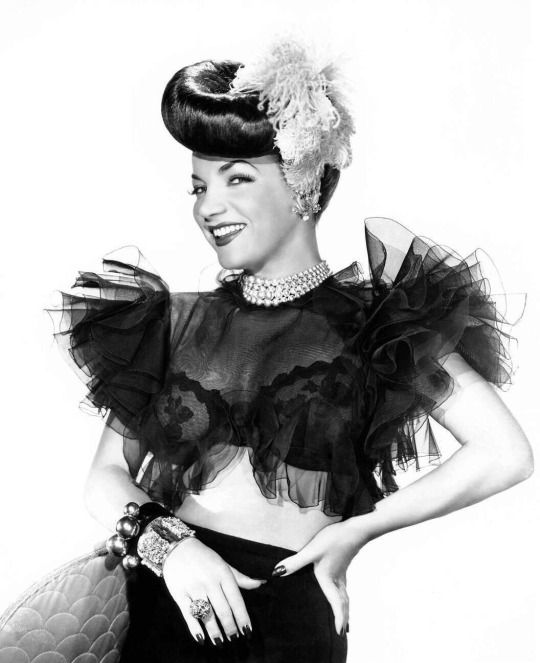

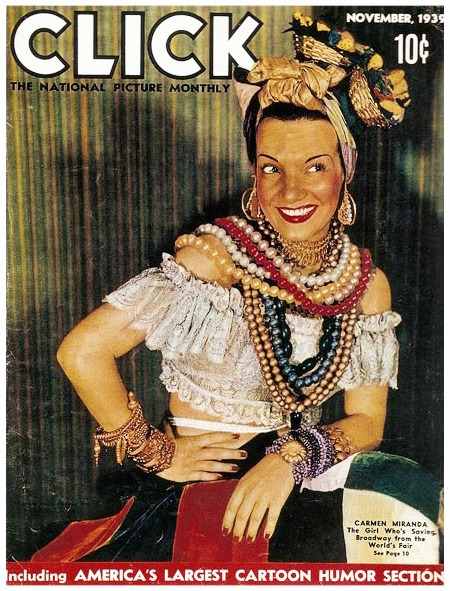
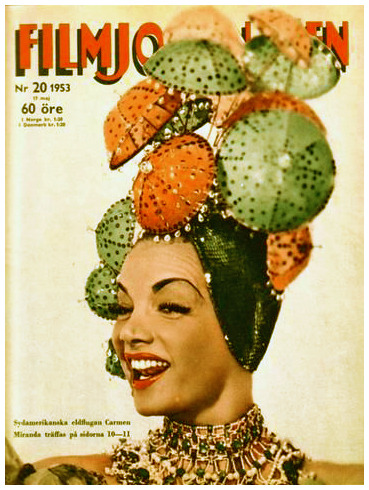
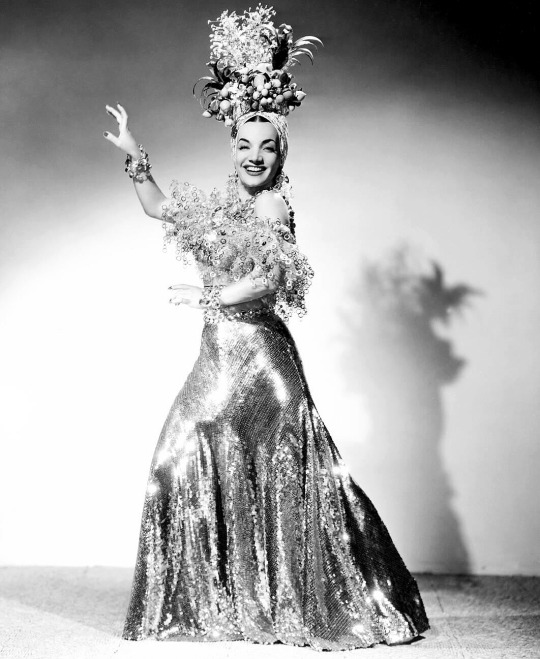

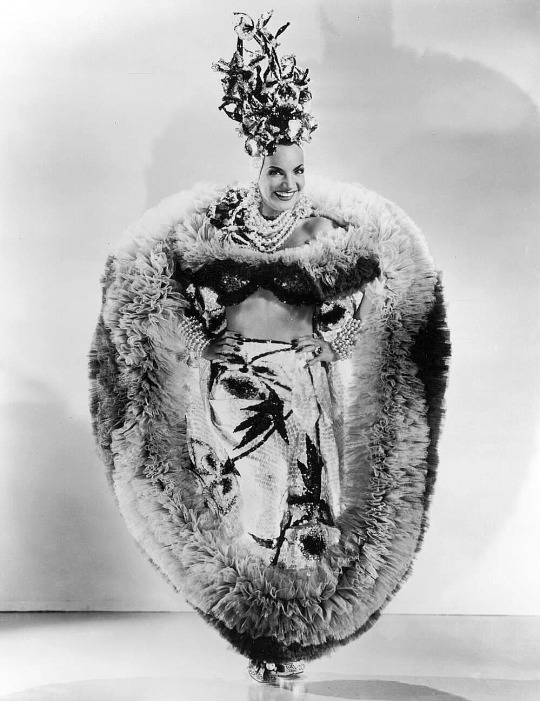
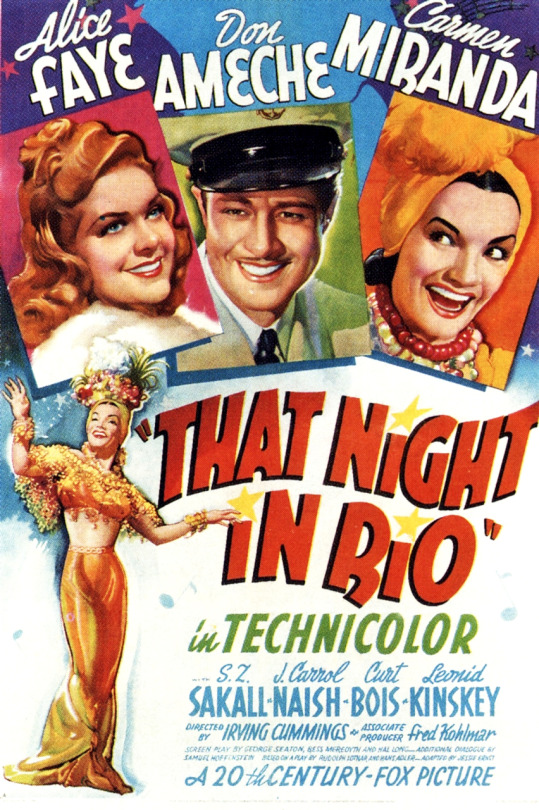
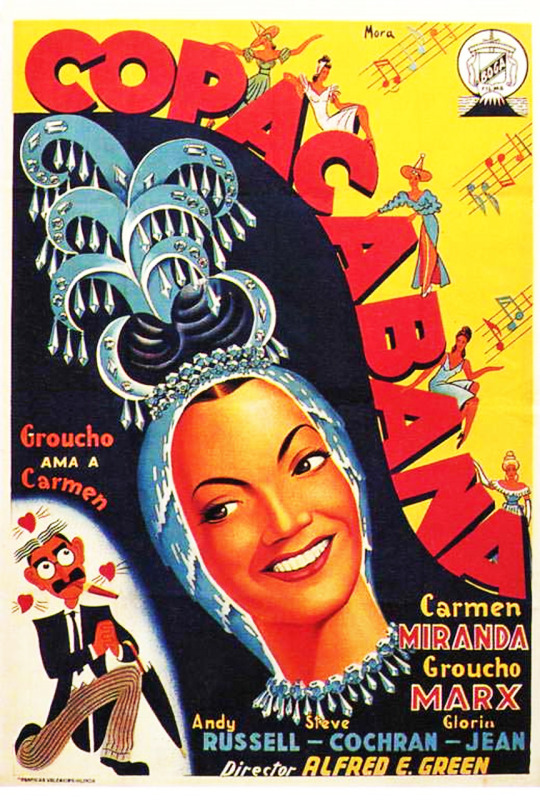
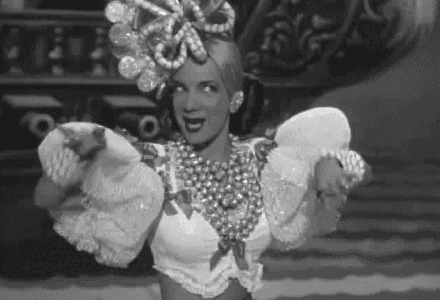

Carmen Miranda (born Maria do Carmo Miranda da Cunha in Marco de Canaveses, Porto on February 9, 1909) was a Portuguese-born Brazilian singer. Nicknamed "The Brazilian Bombshell", she was known for her sass and signature fruit hat outfit that she wore in her American films.
Miranda was introduced to a composer while working at her family's inn and soon recorded her first single in 1929. She then signed a two-year contract with Rádio Mayrink Veiga, the most popular Brazilian station of the 1930s. Her rise to stardom in Brazil was linked to the growth of a native style of music: the samba.
At the invitation of US show business impresario, Lee Shubert, who saw her perform in Rio's Cassino da Urca, she came to Broadway and starred in hit musicals.
When news of Broadway's latest star reached Hollywood, Twentieth Century-Fox offered her a contract in 1941. Her most memorable film performances are in the musical numbers of films such as Week-End in Havana (1941) and The Gang's All Here (1943). After World War II, Miranda's films at Fox were produced in black-and-white, indicative of Hollywood's diminishing interest in her. As a result, she produced her own films to limited success. Although her film career was faltering, her musical career remained solid and she was still a popular nightclub attraction. She continued to tour the US, Europe, and Latin America.
After filming a segment for the NBC variety series The Jimmy Durante Show, where complained of feeling unwell, she died at home in Beverly Hills, California from a heart attack. She was 46 years old.
Legacy:
Was the first contract singer in Brazilian radio history; subsequently, the highest-paid radio singer in Brazil in the 1930s
Chosen by former Brazilian president Getúlio Vargas as a goodwill ambassador to the United States in 1939
Was the first Latin American star to have a block in the forecourt of Grauman’s Chinese Theatre in 1941
Was Hollywood's highest-paid entertainer and the top female taxpayer in the US in 1945, earning more than $200,000 that year
Has a museum in Rio de Janeiro, Museu Carmen Miranda, established in her honor in 1976
Received the Ordem do Infante Dom Henrique Grande Oficial, a Portuguese order of knighthood, in 1995
Has a square in Hollywood named Carmen Miranda Square with a ceremony headed by honorary mayor of Hollywood Johnny Grant and attended by Brazilian consul general Jorió Gama in 1998
Was one of 500 stars nominated for the American Film Institute's 50 greatest screen legends in 1999
Honored by the Museum of Modern Art in Rio de Janeiro in 2005 and the Latin America Memorial in São Paulo in 2006 with a Carmen Miranda Forever exhibit to commemorate the 50th anniversary of her death
Bestowed the Ordem do Mérito Cultural by the Ministry of Culture of Brazil in 2009
Was a part of a set of commemorative US Postal Service Latin Music Legends stamps, painted by Rafael Lopez, in 2011
Commemorated in the 2016 Summer Olympics closing ceremony with a tribute
Honored with a Google Doodle on her 108th birthday in 2017
Was the first South American honored with a star on the Hollywood Walk of Fame at 6262 Hollywood Blvd for motion picture

#Carmen Miranda#The Brazilian Bombshell#Brazilian Bombshell#Samba#Chiquita Banana#Cantora Do It#Ditadora Risonha do Samba#A Pequena Notável#Silent Films#Golden Age of Hollywood#Film Classics#Old Hollywood#Vintage Hollywood#Hollywood#Hollywood Walk of Fame#Walk of Fame#Movie Legends#movie stars#1900s#28 Hollywood Legends Born in the 1900s
40 notes
·
View notes
Text
The Business Benefits of Backlink Optimization
These were a few benefits offered by backlink optimization. Connect with SEO Resellers Canada to build credible backlinks. Read more: https://seoresellerscanada12.blogspot.com/2024/01/the-business-benefits-of-backlink.html
0 notes
Photo
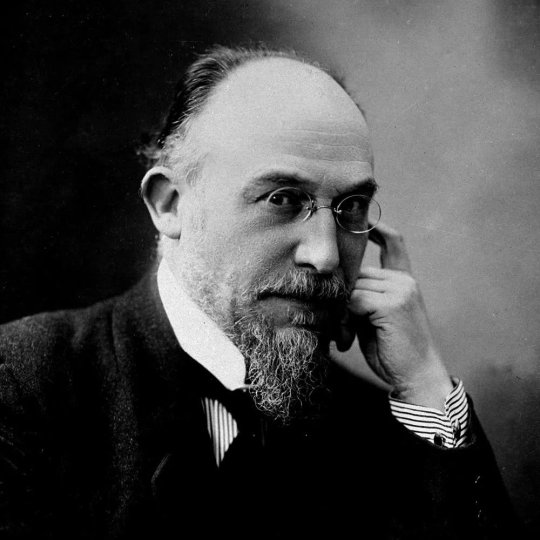
I am by far your superior, but my notorious modesty prevents me from saying so.
- Erik Satie
To his contemporaries and peers Erik Satie was something of an enigma. Just a few of his quirks included claiming he only ate white foods, carrying a hammer wherever he went, founding his own religion, eating 150 oysters in one sitting, and writing a piece with the instruction to repeat 840 times! As a composer, Satie paved the way for the avant-garde in music and became a very influential figure in the classical music of the 20th century whose works still sound fresh today.
Born into a poor and difficult childhood in the Normandy harbour town of Honfleur on 17 May 1866, Satie would always be an outsider. The Paris Conservatoire to which he was enrolled by his stepmother, herself a pianist, became for him “a sort of local penitentiary” during his teens; he left with no qualifications and a reputation for being lazy. He signed up for military service in 1886 and dropped out within the same year. Immersing himself in the bohemian life of Montmartre, he became linked with the popular music scene and eked out a living as an accompanist, playing at the Chat Noir cabaret. Always on the periphery, and forever out of money, he later downgraded from the cramped room in which he lived to the less fashionable Parisian suburb of Arcueil, where he holed up in isolation and squalor – no visitors set foot in the room during the near-30 years he lived there.
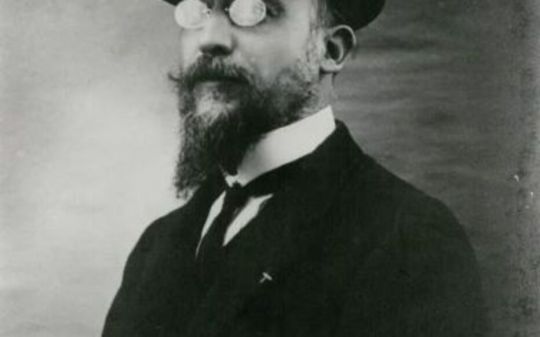
Much has been made of the eccentricities of this flâneur, who was always seen in a grey velvet suit, and yet underlying Satie’s music is his serious desire to create something new. You can hear it in his popular piano pieces: the haunting scales and rhythms of the Trois Gnossiennes written under the spell of Romanian folk music, and the meditative world of Gymnopédies, where, as in a cubist painting, motifs are “seen” from all sides. At a time when French composers were looking to escape the shadows of Wagner’s epic Romanticism, the French composer’s stripped-back mechanical sound, inspired by the humble barrel organ, offered a radically simple approach.
Satie preferred originality to the mundane. The composer of the famous Gymnopedies, could never be accused of having an uninteresting personality. For one, his outgoing fashion statements always caused a stir. During his Montmartre years, he had 12 identical velvet corduroy suits hanging in his wardrobe, which earned him the nickname ‘The Velvet Gentleman’, and in his socialist years, he donned a bowler hat and carried an umbrella.
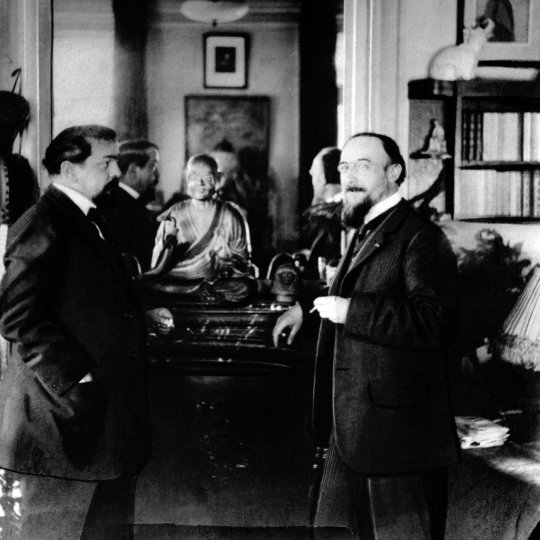
Debussy helped to draw public attention to Satie, orchestrating two of his Gymnopédies, yet Satie had to wait until much later in life to attain celebrity status. While still earning a living writing salon dances and popular cabaret songs, and after suffering a creative crisis, he enrolled himself at the Schola Cantorum in Paris at the age of 39. Rather than finding him validation, his studies seem to have fuelled his hatred of convention - it’s with more than a hint of bitterness that he claims to put “everything I know about Boredom” into the Bach chorale of his masterful Sports et Divertissements piano pieces. But notoriety led to a succès de scandale and when it came it came with a bang in Parade, his surreal, one-act circus ballet for Diaghilev. Into the orchestral score, which featured jazz and cabaret tunes, were thrown typewriters, sirens and a pistol - just the kind of noises a wartime audience would normally pay not to hear. With its rigid cubist costumes by Picasso - which restricted Massine’s choreography - and a promotional push from Cocteau, it was provocative enough to secure Satie’s position at the vanguard of modernism.
Yet Satie was continually frustrated in his attempts to be accepted as an artist in high society France - his failure to establish himself at the prestigious Académie des Beaux-Arts, to which Debussy had won a scholarship, only compounded his resentment. Was this treatment by the cultural elite fair? Certainly his determination to antagonise his audience in his late ballets did little to endear him to the critics, but the fierce criticism he received in Paris was also a sign of things to come. Pierre Boulez would later poke fun at Satie’s lack of craft, while composer Jean Barraqué - another proponent of 12-tone music - would deride Satie as “an accomplished musical illiterate … who found that his friendship with Debussy was an unhoped-for opportunity to loiter in the corridors of history”.
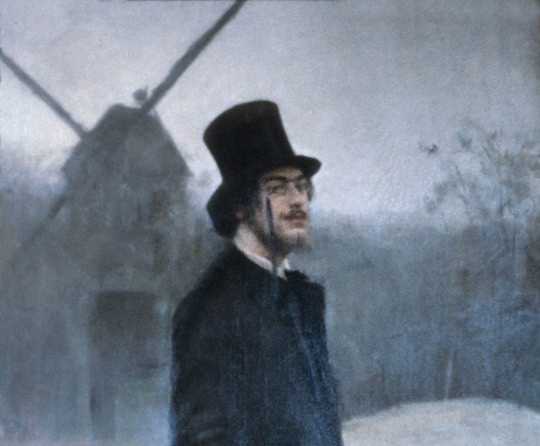
Satie is perhaps, to this day, the most audacious and original composer when it comes to naming his works e.g. Gnossiennes and Gymnopédies. With Satie you will not see symphonies, concertos or opus numbers. Satie possessed a wicked sense of humour and his mockery, both of himself and others, became an inspiration for many of his irony-tinged works. His Sonatine bureaucratique is a spoof of Muzio Clementi’s Sonatina Op. 36 and contained many witticisms in the score. For example, he writes Vivache (vache being French for cow) instead of the original Italian tempo marking Vivace.
Whether in the collage-like miniature piano parodies he wrote during the World War I, his creation of a theatre format that has endured over the years, or in his collaboration with Jean Cocteau, Pablo Picasso y Sergei Diaghilev, there is a liveliness of imagination and a hunger for innovation that made Erik Satie In the torch bearer of the vanguard in his work. Satie would influence so many so strongly that years later some of his closest friends became radical artists, for example. ManRay, the sculptor Constantin Brâncusi, and Marcel Duchamp, or a much younger group of Paris-based composers like Les Six.
Satie, a known drinker of absinthe, and apparently every other alcohol available, died of cirrhosis at the age of 59 in Arcueil, France in July 1925. But his compositions, especially those deceptively simple-sounding solo piano works, find life today through recitals, concerts, and great movie scores. Although he died in poverty with little success to his name, today Erik Satie is acknowledged as a founder of 20th-century modernism, who changed the face of music.
Personally I do find Satie's music enriching, But I also find that his calculated wackiness is culturally apt. Pieces like ‘3 Pieces in the Shape of a Pear’, ‘Flabby Preludes for a Dog’ and ‘Desiccated Embryos’ rewardingly deflate Wagnerism's excesses in a characteristically French way.
#satie#erik satie#quote#music#classical music#composer#pianist#debussy#modernism#paris#french#france#arts#culture#french culture#innovation#artist#life
180 notes
·
View notes
Text
1. What is Google My Business (GMB) optimization for local SEO? GMB optimization is the process of enhancing your Google My Business page to improve its visibility in local search results. It involves optimizing your business information, posts, reviews, and other elements to attract more local customers.
2. Why is GMB optimization important for local SEO? GMB optimization is crucial because it helps your business appear in the Map 3 Pack and local search results. This visibility can significantly increase local traffic, customer engagement, and ultimately, revenue.
3. What does GMB optimization involve? GMB optimization includes actions like updating your business information, creating engaging GMB posts, managing reviews, ensuring NAP consistency, and building relevant backlinks, among other strategies.
4. How long does it take to see results from GMB optimization? The timeline for results can vary depending on factors like competition and your current GMB profile. Typically, you may start seeing improvements in a few weeks, but it can take several months to achieve significant gains in local SEO rankings.
5. Can I do GMB optimization on my own, or should I hire a professional? You can attempt GMB optimization on your own, but hiring a professional or experienced service provider is often recommended for more effective and efficient results. Professionals have the expertise to navigate the complexities of local SEO.
6. What is the cost of GMB optimization services? The cost of GMB optimization services varies based on the provider, the scope of work, and the level of competition in your area. You can find services ranging from one-time optimizations to ongoing monthly packages.
7. Is GMB optimization a one-time task or an ongoing process? GMB optimization is an ongoing process. It's essential to continuously update your GMB profile, create new posts, gather reviews, and adapt to changes in the local search landscape to maintain and improve your rankings.
8. Will GMB optimization guarantee a top spot in the Map 3 Pack? While GMB optimization significantly increases your chances of ranking well in local search results, it does not guarantee a specific position. The local search algorithm considers numerous factors, and competition plays a role.
9. What benefits can I expect from successful GMB optimization? Successful GMB optimization can lead to increased local website traffic, more phone calls from potential customers, a higher local marketing reach, improved domain authority, and better overall website ranking.
10. How can I measure the success of my GMB optimization efforts? You can measure success through metrics like increased website traffic, higher rankings, more phone calls, and the number of customers coming from your GMB profile. Tools like Google Analytics and GMB Insights can help track progress.
Remember that GMB optimization is a dynamic field, and staying updated with the latest local SEO trends and best practices is essential for long-term success.
#seo optimization#gmb posts for location#seo marketing#digital marketing#local seo#seo services#seo#white hat seo#onpage seo#seo changbin#offpageseo#on page seo#gmb optimization#googlemybusiness#googlebusinessreviews#googlebusinessprofile#whatisgooglemybusiness#link building#local citations
0 notes
Text
Mechanic VS Glamrocks
It's dark and damp where you are cornered, the only light you can actually see with coming from the bright overhead light in the protective cylinder. Your breathing is quick, and your pulse quickens. You thought that working with the Glamrocks would be fun. Cool, even. This is something from straight out of your nightmares.
Three of the main four have you surrounded in Parts and Service. Roxy and Chica are standing guard on either side of the door to the cylinder, but the angry green gator is the one that has you trapped here. Freddy is nowhere to be seen, but you know if the fatherly tempered bear was here, you wouldn't be subjected to this!
You wipe the sweat forming on your brow and squirm. You just wish for this, this torture to end!
"Monty, please!" Your plead and it falls on deaf ears… microphone? Whatever the animatronics use to hear with. You could almost cry. The unshed tears of strife were stinging, and threatening to fall, but you had just enough pride to keep them at bay…for now.
You couldn't keep doing this, you couldn't take it!
Monty looks at you cruelly and bellows a laugh that echoes within the metal of his casing and the cylinder itself, amused by your apparent discomfort. Chica and Roxanne are cackling at your expense, as if your pain were funny to them. It probably was, thinking about it. They wouldn't have been so amused otherwise, you think to yourself.
You're getting to a point where you are uncomfortable. You thought the Glamrocks were supposed to be nice. Kind. Cared about the feelings of others. The treatment you're getting now is nothing short of cruelty, of barbaric-ness, of insanity!
It was like they had all gone mad, and their only objective was to kill you.
Monty blasts Take Me On louder from his speaker. You bite your lip.
"This is so stupid! You always pick the songs I can't resist!" You whine, your arms elbow deep in robotic gator guts. He had fallen, again, into the marsh in Gator Golf and had filled up with dirty, disgusting water. Monty was now propped up on the huge chair in the protective cylinder and you were doing your damnedest to dry him out and save him from any lasting water damage.
"Go ahead, Mechanic, you're gonna lose anyway." Monty says cockily with a laugh.
You and the Glamrocks were playing the usual game of 'IF YOU SING OR DANCE ALONG TO THIS SONG, YOU LOSE A KIDNEY!'. Except no actual kidneys are in danger. Only your pride.
"You're getting a free show, stop complaining so much." Roxy quips after she rights herself. She begins primping, fluffing her fluffy white hair and using the glass of the cylinder like a mirror. She began effectively ignoring everyone in favor of admiring her reflection, losing her amusement in anything outside of herself.
Chica squawks loudly after a couple minutes, and flaps her arms like her real life counterpart, knocking over cans of oil, paint and air duster, startling everyone. "Ohh! Oh, Monty play this one, play this one!" She stills, sending him a link through the animatronic only network, you assume. It was the only time they go unnaturally still like that, unless they are charging or powered off. You just got done checking over Chica, so you know she had full battery and no cause to just randomly turn off at the drop of a hat.
Monty nods, wicked smile forming on his minimally moving maw. You don't think you're going to like what's to come.
Music and theatre have always been your thing. You were still a theatre kid at heart, dramatic and over the top, and you sung like a canary, especially when you were alone, down in Parts and Service by yourself, flittering around after closing. Trying not to disturb the public with your 'off tune screeching' as Moon liked to call it.
You would just belt out whatever song was wracking around in your brain. It was almost like you had a playlist in your head, cocked and loaded for you to pick and choose from. The Glamrocks, on stage and off, have only added to your growing list. You still love it though, and it's one of your favorite things about working with literal rockstars.
It's also you're least favorite.
Even if you don't really know a certain song, if it has a good enough beat, you kind of have to just vibe with it. It puts you in the mind of Freddy and his programming to jam out on DJ Music Man's dancefloor. You have joked that you have the same programming.
Did that mean you were any good at it? Absolutely not. You admit, you are mid at best. Try telling your heart that, though. You heart believed itself to be a rockstar of the same caliber you're working on.
So now, you were wiggling in place, trying to stay still and stay focused while getting the water out of Monty's deep chest, and dry out his wiring before he started short circuiting. That meant very delicate work, which meant that you had to take your time which meant that your head had to be next to his speaker, where he could blast every song you loved and you wouldn't be able to get away, lest leaving him to rust.
You flex and curl your toes and do controlled breathing to try and work through it.
You were a third of the way done by the time he finds the next song.
"Damned copyrights." Monty curses while the song loads. He, along with all the animatronics, are hooked up to the Plex's WIFI and can access any music streaming app there is. The only catch is that they may access any music but can't play any music. Labels being afraid of the Band stealing songs for their shows or something. So, Monty had to go and find some unofficial lyric video or fan-imation project so he could play the song.
You start to laugh, calming down enough to effectively work. "Yeah, you almost had me the-"
Careless Whisper plays. Loudly.
You scream. You cry. You gag. You beg.
You lose yourself to the tune of Careless Whisper. Twice.
You slam Monty's chest plate shut. It took you an hour and a half to finish a twenty minute job. You are still a little bit proud of yourself, given such harsh working conditions.
The Glamrocks go to leave, filing out one-by-one and you go about cleaning up your mess. Monty pops his head back into the cylinder. "Hey, Mechanic, you want some singin' lessons? You were a lil' flat back 'ere." You throw the shop towel in your hand at the gator. He catches it flawlessly.
"Yeah, yeah, whatever! Don't try to fall into the swamp water next time." You quip with a smile.
The towel hits you in the back of the head forcefully enough to knock you forward.
#fnaf fandom#fnaf daycare attendant#fnaf moon#fnaf security breach#moondrop#sb sun#sundrop#daycare attendant#glamrock monty#monty gator#fnaf monty#fnaf roxy#roxy wolf#fanfic#dca because they’re my favorite#glamrock chica#fnaf#roxanne wolf#five nights at freddy's#mechanic reader#wholesome#or tried to be#my fic#small snippet#drabble#fluff
24 notes
·
View notes